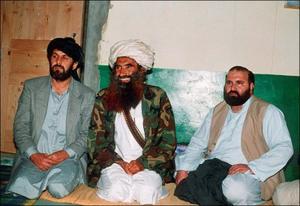TerrorismLawmakers call for adding the Haqqani Network to U.S. terror-group list
A group of Republican and Democratic lawmakers are calling for the Obama administration to add the Haqqani Network to the U.S. list of terrorist organizations; the administration is not quick to move on the issue of designation because of the on-going U.S.-Pakistan-Taliban negotiations about the future of post-withdrawal Afghanistan, but the military drone attacks on Haqqani targets is continuing unabated

Leadership of the Haqqani terror network // Source: pakistankakhudahafiz.com
A coalition of Republican and Democratic lawmakers are calling for the Obama administration to add the Haqqani Network to the U.S. list of terrorist organizations. In a letter to Secretary of State Hillary Rodham Clinton released Friday, Senate Intelligence Committee chairman Dianne Feinstein (D-California), Vice Chairman Saxby Chambliss (R-Georgia), and House Intelligence Committee chairman Mike Rogers (R-Michigan) and ranking member C. A.“Dutch” Ruppersberger (D-Maryland) wrote that after classified briefings on their recent trip to Afghanistan, “It was clear that the Haqqani Network continues to launch sensational and indiscriminate attacks against U.S. interests in Afghanistan and the group poses a continuing threat to innocent men, women, and children in the region.”
The lawmakers noted that the State Department may designate a group a terrorist organization if it is foreign, engages in terrorist activity, and threatens the security of U.S citizens. In November, the State Department said it was conducting a “final formal review” of whether to designate the group. “Six months have now passed, and the Haqqanis have continued to attack U.S. troops and the U.S. Embassy in Kabul during that period,” the lawmakers wrote Clinton.
The Los Angeles Times reports that the lawmakers added that the Obama administration had been reluctant formally to call the Haqqanis terrorists while U.S. officials attempted to negotiate a reconciliation agreement with the Taliban — a deal that may have included or affected the Haqqani Network. “However, Ambassador Crocker told us last week that there have been no such talks since late last year,” the lawmakers wrote, referring to Ryan Crocker, the U.S. ambassador to Afghanistan.
BloombergBusinessWeeknotes that the 1980s, the CIA backed the Haqqanis and supplied them with money and weapons so they could fight against the Soviet occupation of Afghanistan. In the years since, the group has become an organization resembling a crime family, seeking to maintain – and expand — its empire of smuggling, kidnapping, and extortion in Pashtun tribal areas in provinces on both sides of the Afghan-Pakistan border.
In the last four or five years, the ISI, Pakistan’s intelligence service, has began to arms and train the Haqqanis, and send them on military missions inside Afghanistan against the police and military forces of the Karzai government. In the last two years, the Pakistanis have encouraged the Haqqanis to attack U.S. and coalition forces directly. Pakistan’s goal is to make sure that no strong central government emerges in Afghanistan which does not have a strong presence of the Taliban in it. While the Pakistani government is engaged in a war against the Pakistani branch of the Taliban – because of the latter’s effort to topple the Pakistani government – the Afghani Talibans are viewed as allies of Pakistan. The Haqqanis’ attacks on the Karzai government forces, and on U.S. and coalition forces, have already led to secret U.S. negotiations with moderate elements within the Afghani Taliban over the status of the movement in Afghanistan after U.S. withdrawal.
The closeness of Pakistan and the Haqqani Network is the reason for the administration’s hesitation on the terror designation question. “Once you designate the Haqqani network, how do you not designate Pakistan as a state sponsor of terrorism,” Bruce Riedel, a senior fellow at the Brookings Institution, told BloombergBusinessWeek. He added: “There’s a tension between our [current] counterterrorism objectives and our [post-withdrawal from Afghanistan] reconciliation objectives, which produces a reluctance to act on the Haqqani network.”
The administration, though has not waited for the designation issue to be settled to act forcefully against the Haqqanis. U.S. dron attacks have often targeted Haqqan installations and personnel inside Pakistan. According to Long War Journal, there were 292 drone attacks against terrorist targets inside Pakistan since 2004 (32 under President Bush from mid-2004 to the end of 2008, and 260 since President Obama came to office in January 2009) – of which, 73 attacks have been against Haqqani targets. Last October, for example, a CIA drone strike killed Janbaz Zadran, who had been described as the third-ranking leader of the network.
